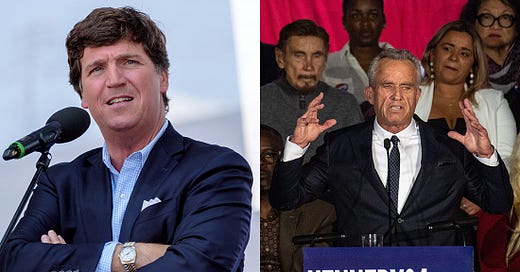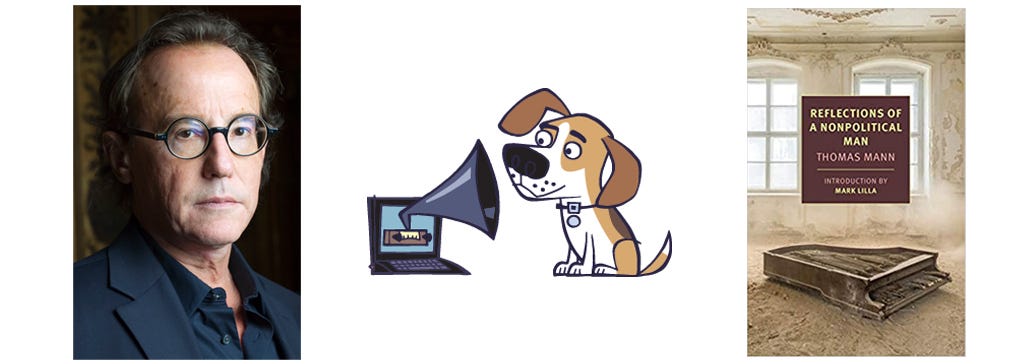The Biden campaign is now officially on, and it has a slogan: “Finish The Job.” No, I’m not making that up. The exhilaration everyone feels is only intensified by the off-the-record briefing that the president is aiming to improve the image of his staggeringly awful veep, Kamala Harris. In the same week that Biden read scripted answers to scripted questions at a presser — he’s given fewer than any president since Reagan — David Frum couldn’t stop himself from predicting the “coming Biden blowout.” Tribal left-media, from The Nation to The Bulwark, are in the middle of a campaign to take out any possible rivals to Trump so a Democratic landslide is guaranteed. What a week!
And yet 70 percent of Americans — and a slight majority of Democrats — remain remarkably unmoved. They don’t want Biden to run again. That’s even more than the 60 percent who don’t want Trump to run again. And the news this week was dominated not by the president’s bid for re-election, as one might expect, but by a cable host’s sudden dismissal from Fox News. And you can understand why. The thought of a Trump-Biden rematch is soul-deadening and mind-numbing to me and countless others — which is why 38 percent of the country describe themselves as feeling “exhausted” by the prospect. Ask yourself this: if you woke up tomorrow to discover that neither man was going to run next year, how would you feel?
Precisely.
This exhaustion offers, it seems to me, a real opening for something fresher, younger, and more attuned to our actual moment. On the right, there are interesting new directions toward a foreign policy looking to avoid ever-more international conflicts, toward an economic policy more geared toward the interests of working-class Americans, and against the corporate-government-mandated indoctrination campaigns tearing at the precepts of liberal democracy, and empirical reality.
That’s why I’ve been intrigued by Ron DeSantis, even as his potential candidacy has been thrown off by the Trump indictment, intense elite media hatred, and his own, somewhat glaring, character flaws. On the left, there are also some green shoots of articulate dissent against the Biden steamroller in the same anti-corporate, anti-elite, left-populist vein. The Bernie void remains. Covid helped expose the elite corporate-government-MSM merger for many Americans. Biden represents it. And Trump represents nothing but himself.
Who else is there? I hope you’re sitting down, but in all this, two men stand out to me: Tucker Carlson and Bobby Kennedy Jr. Very different, but weirdly simpatico, it did not shock me that the vaccine-skeptical Kennedy was given time on Carlson’s show to make his presidential pitch. (Watch the segment here.) Both have become anti-corporate populists, lone rangers in their own partisan coalitions. Both believe the US war against Russia is misguided, and led by the same dumb elites who took us into Iraq. Both have come to suspect the US military, intelligence services and pharmaceutical industries. Both loathe Tony Fauci — the patron saint of the pharmaceutical-government-media complex.
And yes, it would be easy and probably wise to dismiss them as cranks and conspiracy theorists. (But watch this ABC News segment to see how MSM attacks on this theme can backfire.) Both Tucker and Bobby represent, it seems to me, something nonetheless real: a deepening suspicion of corporate and government authority, a refreshing willingness to junk partisan orthodoxy, and, in an age of utter cowardice, what can only be called nerve.
There are aspects to Carlson’s message I find repellent, specifically the refusal to call January 6 what it was, the fathomless cynicism behind his public defense of Trump, his absurd love-in with Viktor Orbán, and the racist tinge to some of his comments on immigration. (His insistence that mass migration is a disaster is, to my mind, entirely justified.) And with Kennedy, I just don’t buy the anti-vaccine campaigns, or his profound alienation from what he sees as the deep state. I’m not as fed up as either of them.
But I’ll confess I also find them appealing, in a way Trump and Biden could never be. Kennedy sees clearly how the Dems have become the party of big corporations, HR authoritarians, and the mega-wealthy. Carlson sees the totalitarian essence of wokeness, its denial of core American values, and the cynical distraction of critical theory madness when most middle-class Americans are overwhelmed, overworked, and dying prematurely in large numbers. Neither is easily intimidated. Kennedy also feels in his bones the spiritual desolation out there, and grasps our duty to balance prosperity with care for the planet.
Kennedy gets some support from the right on his hostility to Big Science, especially the excesses and toll of the Covid lockdown and the ever-shifting evidence against the “follow the science” consensus. Carlson gets some love from the left, with his economic populism and his loathing of Big Tech: “His 2019 story on how hedge fund manager Paul Singer orchestrated a merger of Cabela and Bass Pro Shops that destroyed a town in Nebraska had few equals in broadcast news as a critique of financialization’s impact on neighborhoods and local business.”
This factual acknowledgment of Carlson’s shift on economics provoked outrage from others on the left, and a pathetic apology from the editor of The American Prospect. But their extreme touchiness tells you something about his potential appeal. Carlson was a rare voice on cable who made big corporate advertisers nervous, and openly shifted away from libertarianism and neoconservatism toward a more traditional conservative concern for social cohesion, and for the limits of interventionism abroad.
This took some bravery and intellectual independence. Similarly, it took balls for Kennedy to stick to his anti-vaccine guns, even as the media, the Democrats and members of his own family effectively disowned him over it. And it took courage for him to challenge the Dems’ lockstep support for the ever-expanding, unwinnable and expensive war in Ukraine. I suspect voters are looking for men and women with a modicum of integrity in our current ugliness.
Bobby is now 69 years old, but seems much younger. Fun disclosure: I’ve known him personally through my old friend and his brother, Max, and always found him straightforward and disarming — if deeply troubled. This week, as I watched his campaign speech, and absorbed a long but riveting interview by David Samuels in Tablet, I was rustled out of my assumption that he’d simply gone nuts (as others in his family believe). Here is how Samuels frames the candidacy of “one of the most effective environmental activists in the country”:
[T]he case Kennedy made in his [2005 anti-vax article “Deadly Immunity”] was no more or less plausible and empirically grounded than the cases that he and dozens of other environmental advocates had been making for decades against large chemical companies for spewing toxins into America’s air, water, and soil, and then lying about it. […] Now that conspiracy theories have gone mainstream, who better than RFK Jr. to authentically understand and communicate with a public that is rightly suspicious of the poisons in its water and air, the dishonesty of the public health bureaucracy, and the toxic nature of official discourse.
Kennedy is coherent, has an insane grasp of detail, and can speak extemporaneously with a skill not seen since Obama. He’s also broken — by tragedy, addiction, loss, and failure. (You can almost hear it in his cracked voice, caused by a rare disorder.) His father and uncle were murdered, his brother died of an overdose, he spent time hooked on heroin, and his ex-wife, Mary, hanged herself. But brokenness has its strengths in a leader, especially if you want to revive Americans’ faith in themselves and in their future. Imagine a president able to truly get the opioid crisis — because he remains in recovery. We are in some ways a broken country. And we will not heal by repeating the 2016 and 2020 presidential cycles.
I’d like both Carlson and Kennedy to run for president: to rattle the corporate, media and government elites, to force a rethink on both the complacent right and loopy left, and to break up the Trump-Biden dynamic, which is as depressing as it is toxic for the country as a whole. Amazingly, Kennedy already has 19 percent support in some polls against Biden — a function of name-recognition, of course, but also a sign of deep restlessness in Dem ranks when contemplating Biden in his extended dotage, with Kamala in the wings. And I can’t help but wonder how much support Tucker could sustain against Trump, if he were to try to kill the king. I have a feeling it might be more impressive — especially given his defenestration — than we might expect.
And look: stranger things have happened. In an era when elites have lost so much trust, it would be great to find a future president who might, by pluck and anti-establishment fervor, regain it. No, I’m not endorsing either. But we need both of them in the mix — for a healthier, more democratic politics.
(Note to readers: This is an excerpt of The Weekly Dish. If you’re already a subscriber, click here to read the full version. This week’s issue also includes: my long chat with Mark Lilla on how politics isn’t everything in life; many sharp reader dissents over my views on Dylan Mulvaney; nine notable quotes from the week in news, including Hillary and Fauci; 20 links to recommended reading on Substack on so many topics; a Mental Health Break of my favorite musical duo; a scenic window from LA and a bleak one from Bangkok; and, of course, the results of the View From Your Window contest — with a new challenge. Subscribe for the full Dish experience!)
From an evangelizing subscriber:
I have listened to many, many of the Dishcast episodes at the gym. The conversations make me feel sane while pushing me to explore more, and I often recommend them to friends.
New On The Dishcast: Mark Lilla
Mark is a journalist, political scientist, historian of ideas, and a longtime friend since my twenties, when we studied political thought together. He has taught at NYU and the University of Chicago, and he’s currently a professor of humanities at Columbia. His many fine books include The Once and Future Liberal, The Reckless Mind, and The Shipwrecked Mind, and his forthcoming book is Ignorance and Bliss: On Wanting Not to Know. In this episode we focus on his essay, “On Indifference,” and the introduction he wrote for Thomas Mann’s Reflections of a Nonpolitical Man. It was a fantastic conversation.
Listen to the episode here. There you can find two clips of our convo — on whether political indifference is unjust, and the political consequences of the decline of novel reading. That link also takes you to commentary on our episodes with Susan Neiman on wokeness and Bob Kaplan on geopolitics. You can also find a lot of strong reader opinions on Dylan Mulvaney, including a glorious rant about the didactic wokeness of Hollywood. I love our readers.
Browse the Dishcast archive for another discussion you might enjoy (the first 102 episodes are free in their entirety — subscribe to get everything else). Coming up: Nigel Biggar on his qualified defense of colonialism, Tabia Lee on her firing as a DEI director, Chris Stirewalt on Fox News, Ben Smith on going viral, John Oberg on veganism, and Patrick Deneen on a post-liberal future. Send your guest recs and pod comments to dish@andrewsullivan.com.
Dissents Of The Week: Stop Kidding Around On TikTok
A reader sees a “profound moral contradiction in your piece about Dylan Mulvaney”:
First this: “The idea that Dylan Mulvaney poses a threat to anyone is bonkers.” Then two paragraphs later: “So someone who is gay is now sending a message to gay boys that they too can transition — and it will be so much fun!” So by your own standards, Dylan is destructive in the most fundamental sense.
Point taken. Two more dissents and my responses here, and many more are here at the bottom of the pod page. Follow more Dish discussion on the Notes site here (or the “Notes” tab in the Substack app).
In The ‘Stacks
This is a feature in the paid version of the Dish spotlighting about 20 of our favorite pieces from other Substackers every week. This week’s selection covers subjects such as SCOTUS vs. Big Oil, anti-Semitism in Labour, and the latest from the “censorship industrial complex.” Below is one example, followed by a two new substacks:
RFKJr Bait: “Pfizer Quietly Financed Groups Lobbying for COVID Vaccine Mandates.”
Welcome, Tim Mak! He’s bootstrapping a ‘stack on Ukraine reporting after NPR laid him off. Help him out. Another MSM refugee is David Aaronovitch, the longtime Brit columnist.
You can also browse all the substacks we follow and read on a regular basis here — a combination of our favorite writers and new ones we’re checking out. It’s a blogroll of sorts. If you have any recommendations for “In the ‘Stacks,” especially ones from emerging writers, please let us know: dish@andrewsullivan.com.
The View From Your Window Contest
Where do you think it’s located? Email your guess to contest@andrewsullivan.com. Please put the location — city and/or state first, then country — in the subject line. Proximity counts if no one gets the exact spot. Bonus points for fun facts and stories. The deadline for entries is Wednesday night at midnight (PST). The winner gets the choice of a VFYW book or two annual Dish subscriptions. If you are not a subscriber, please indicate that status in your entry and we will give you a free month subscription if we select your entry for the contest results (example here if you’re new to the contest). Happy sleuthing!
The results for this week’s window are coming in a separate email to paid subscribers later today. Here’s a glimpse of last week’s cinema report:
Speaking of the world’s highest peaks, I can’t skip this opportunity to visit Everest even though, at a distance of 181 miles from our window, it’s not really in our neighborhood. I’ve gotta grab this opportunity to talk up The Man Who Skied Down Everest (1975). It hit theaters when I was in college, so I was aware of it but managed to avoid seeing it. This cool college kid wasn’t about to be impressed by a movie just because it won the Oscar for documentaries that year. Now because of VFYW, I’ve seen it and am properly impressed.
It’s about an extreme skier and mountaineer from Japan named Yūichirō Miura who at age 37 felt he needed a new challenge. Somehow he roped others into providing support for a Quixotic quest, which if you haven’t already guessed, is given away by the movie’s title. Here’s a trailer that doesn’t do it justice:
But don’t stop with the trailer when the whole movie can be streamed on YouTube (I tried watching it on Freevee, but the commercials there were jarring):
Go ahead. It’s only 83 minutes. You’ve got time.
P.S. Miura returned to summit Everest twice, most recently in 2013 at age 80 (without skis, though).
See you next Friday.






